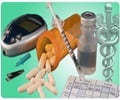In a recent research it was found that umbilical cord blood could help prevent the onset of type 1 diabetes in high risk children.

Mark Kirkland, the medical director of Cell Care and a co-investigator for the study, said worldwide about one in every 2000 to 2500 people with cord blood stored used it, partly because it was an emerging industry and the blood might not be useful for many years.
"It's one of these catch-22 situations that people are storing cord blood in the hope that it will be a future therapy, but a lot of the diseases you are hoping to treat with cord blood won't happen in that population for years or even decades," the paper quoted Associate Professor Kirkland as saying.
The study leader, Maria Craig, said type 1 diabetes had an enormous impact on the children who developed it.
More than 3000 children are born each year who have a first degree relative with type 1 diabetes, putting them at an increased risk of developing it.
Craig, a paediatric endocrinologist at the Children's Hospital at Westmead, said children aged between one and 12 who have a close relative with the condition and cord blood stored with the private bank Cell Care Australia would be eligible to participate in the study.
Advertisement
The children will be screened for antibodies that indicate they are at risk of type 1 diabetes, and those with two or more could enrol in the study.
Advertisement
The research team hope to screen between 600 and 800 children, of whom about 3 per cent are likely to be eligible to participate in the study, which will be run through the Kids Research Institute at the Children's Hospital at Westmead.
Source-ANI















